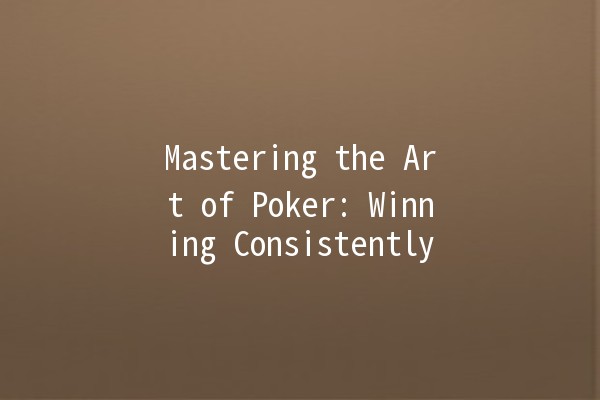Poker, a game of skill, strategy, and psychology, has captivated millions around the world. While luck can play a role, consistently winning in poker requires a deep understanding of the game, sharp analytical skills, and an ability to read opponents. In this article, we will explore several essential strategies to help you improve your poker game and increase your chances of winning over the long haul.
Understanding the Basics of Poker
Before delving into advanced strategies, it's crucial to grasp the fundamentals of poker. Different variations of poker exist, each with its own rules and dynamics, such as Texas Hold'em, Omaha, and SevenCard Stud. However, most poker variants share some common principles:

Key Strategies for Consistent Winning
One of the most crucial aspects of becoming a successful poker player is managing your bankroll effectively. Knowing how much money you can afford to lose without affecting your lifestyle allows you to withstand the inherent variance in poker.
How to Implement:
Set Limits: Decide on a budget for your poker sessions, and stick to it. Avoid playing at stakes higher than you can comfortably afford.
Track Your Results: Keep a record of your wins and losses to understand your performance over time and adjust your play accordingly.
Game Theory Optimal (GTO) refers to a strategy that aims to make your play unexploitable by opponents. By balancing your aggressive and passive plays, you can make it difficult for others to predict your moves.
How to Implement:
Mix Your Play: Don’t always play the same way. For instance, mix your bluffs with strong hands to keep your opponents guessing.
Adjust Based on Opponents: Pay attention to how your opponents play. If they lean towards calling, increase your bluffing frequency. If they fold too often, increase your value betting.
Being able to read your opponents is an invaluable skill in poker. Understanding their tendencies can help you make more informed decisions.
How to Implement:
Observe Betting Patterns: Pay attention to how often your opponents bet, call, or fold. This information can provide insights into the strength of their hands.
Look for Tells: Physical cues or behavioral patterns, known as "tells," can indicate an opponent's strength or weakness. For example, a player who suddenly becomes silent may be feeling pressure.
Your position at the table can significantly impact your strategy. Players in late positions can make more informed decisions based on the actions of those who acted before them.
How to Implement:
Play More Hands in Favorable Positions: From late positions, you can play a wider range of hands because you have more information.
Tighten Up in Early Position: Be more selective about the hands you play when you're one of the first to act. This ensures you're not caught out of position with weak hands.
A continuation bet (cbet) occurs when the player who raised preflop makes a bet on the flop. Cbetting can be an effective strategy for maintaining initiative in a hand.
How to Implement:
Apply Pressure: When you hit the flop with a strong hand, cbetting can help build the pot and apply pressure on your opponents.
Know When to Check: If the board is highly coordinated and likely to have hit your opponents’ ranges, consider checking instead of betting.
Frequently Asked Questions
Position is critical in poker as it determines the order of play and gives insight into an opponent's actions. Players in later positions can make more informed decisions, providing a strategic advantage.
In cash games, chips represent real money, and players can leave at any time. In tournaments, players pay a fixed buyin, and blinds increase over time, adding a layer of strategy focused on survival and chip accumulation.
Regular practice is essential for improvement. Additionally, studying poker theory, watching instructional videos, and reviewing your gameplay across different stakes will accelerate your growth.
Bluffing can be effective when used sparingly. It's essential to consider your table image and the tendencies of your opponents. A successful bluff relies on convincing your opponents that you have a stronger hand.
Tilt refers to emotional frustration that can negatively impact your play. To manage tilt, take breaks when feeling overwhelmed, analyze the situation, and return to the game with a clear mindset.
While luck plays a part in shortterm results, poker is primarily a game of skill. Over a significant number of hands, skilled players will typically outperform those relying purely on luck.
al Thoughts
Winning consistently at poker requires a combination of skill, strategic thinking, and psychological acuity. By focusing on effective bankroll management, understanding GTO principles, reading your opponents, being aware of your position, and employing strategies like continuation betting, you can enhance your game significantly. Remember, the key to poker is patience and continuous learning; even the best players can improve. By committing to these strategies and reinforcing your knowledge, you’re on the path to becoming a successful, winning poker player.